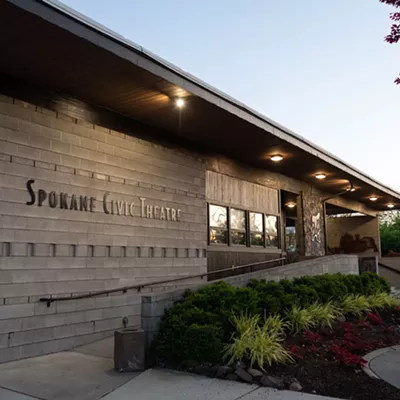The three acts of Our Town might be better described as orchestral movements. The first two focus on daily life and young love in the small New Hampshire town of Grover's Corners; they are the allegro and andante. The third, which deals with death and metaphysics, is the adagio, and the minor key that was only alluded to in the previous movements suddenly leaps to the fore.
Largely through the efforts of artistic director Reed McColm, Interplayers has taken this concerto and made it a chamber piece. A play once known for the size of its cast (around 30, making it ripe for community theater's take-all-comers inclusivity) has become a much tighter, eight-person ensemble work in which most actors play several roles. Our Town already asks so much of its viewers — props are mimed, and the fourth wall is repeatedly razed and rebuilt — that this doesn't seem too great a demand on the imagination. Beyond that, the change introduces just enough novelty to scrub away the patina of familiarity while accentuating the play's inherent modernity.
Modernity isn't an aspect of Our Town that has gone unnoticed over its 75-year existence, but it often gets mentally sidelined in favor of its apparent glorification of a hardworking, salt-of-the-earth rural community, where the political makeup is matter-of-factly "86 percent Republican" and boys and girls marry for life out of high school. The relaxed, folksy charisma of the omniscient stage manager, played here superbly by Patrick Treadway, conceals his pacifist asides and his theologically abstract thoughts on the afterlife.
In fact, the whole third act gently subverts everything up to that point, acknowledging these quaint small-towners to be more "blind" and "troubled" than they — or we — had previously suspected. Wilder, let's not forget, was a translator of Sartre and an admirer of Gertrude Stein; his approach to Grover's Corners is more Left Bank than Mayberry. If it's hard to think of Our Town in this more ambiguous light, therein lies some of its beauty.
So far this season Michael Weaver has directed Church Basement Ladies and Brighton Beach Memoirs. Neither presented any great challenge to rise to, and he met them on their own terms. This new adaptation shows that Weaver is capable of far more given a bit of meat and ambition. Scene changes are fluid, with actors almost imperceptibly shedding clothes as they exit, only to reappear as someone else a short while later. Nothing seems hurried or lacking with respect to the large-cast original. The stage feels every bit as full.
To achieve that fullness, what little cast there is has to go a long way. In at least one case, it falls to a single actor (here, Jerry Sciarrio) to animate eight different characters, and those that inhabit just one (Sarah Uptagrafft as Emily Webb) or two (James Pendleton and Page Byers) have to provide a solid dramatic core for the rest. Pendleton's bright-eyed, golly-gee George Gibbs charms, whereas Uptagrafft is unfortunately prone to the same gaspy melodrama that has typified her roles since Church Basement Ladies. Byers and Maria Caprile both bring delicate differences to their matriarchal roles, with Caprile adopting a jaded monotone that benefits the wry humor of some of her lines. Sound effects like train whistles or clinking milk bottles embellish the actors' prop-less efforts.
Thematically, Our Town is microscopic as well as macroscopic, seeing the details of mundanity and the vastness of eternity as two essential parts of the same whole. Interplayers' adaptation has remained true to this, shrinking the cast count while keeping both the subtleties and enduring appeal of Our Town unchanged. ♦
Our Town • Through Dec. 14: Wed-Sat, 7:30 pm; Sun, 2 pm • $28 ($22 senior/military, $12 student) • Interplayers Theatre • 174 S. Howard • 455-7529 • interplayerstheatre.org






















